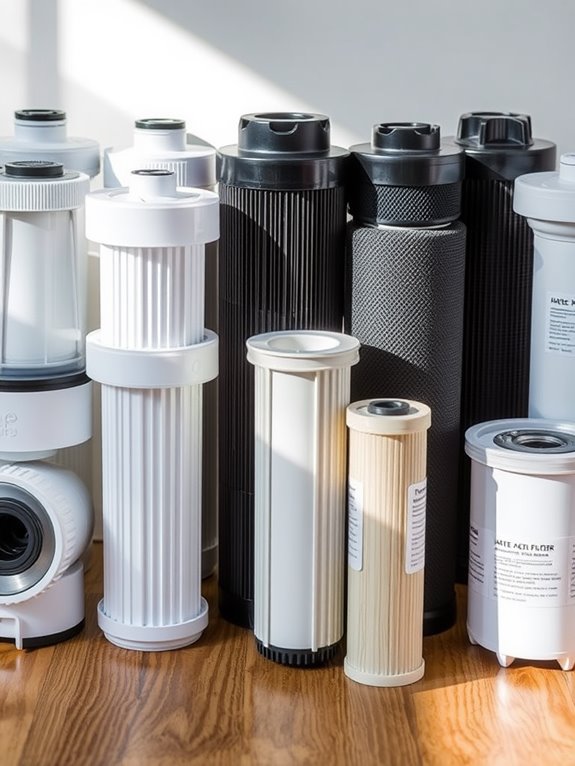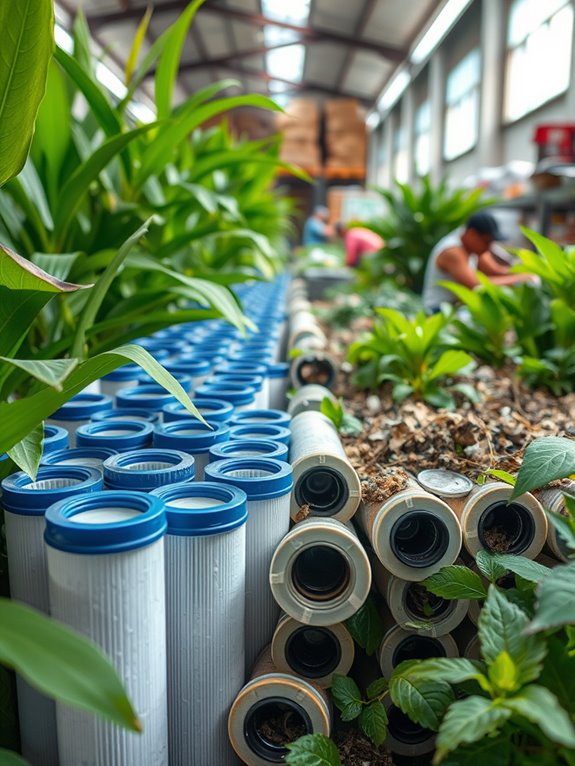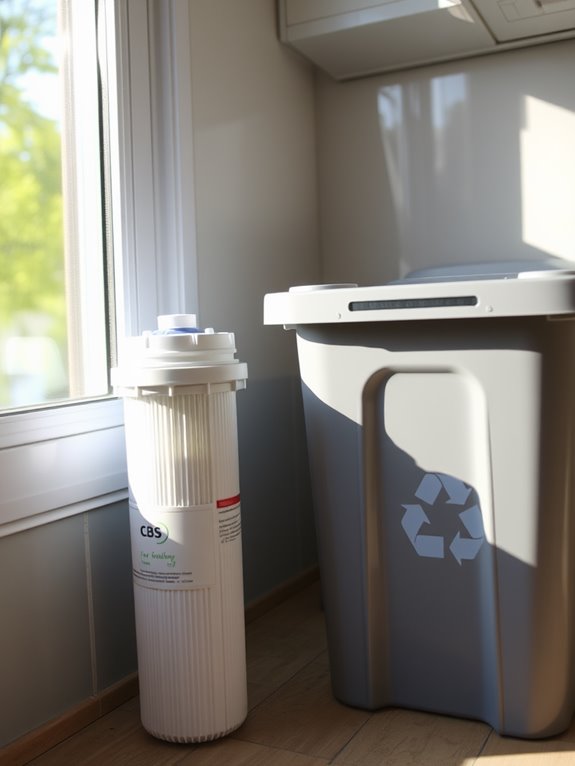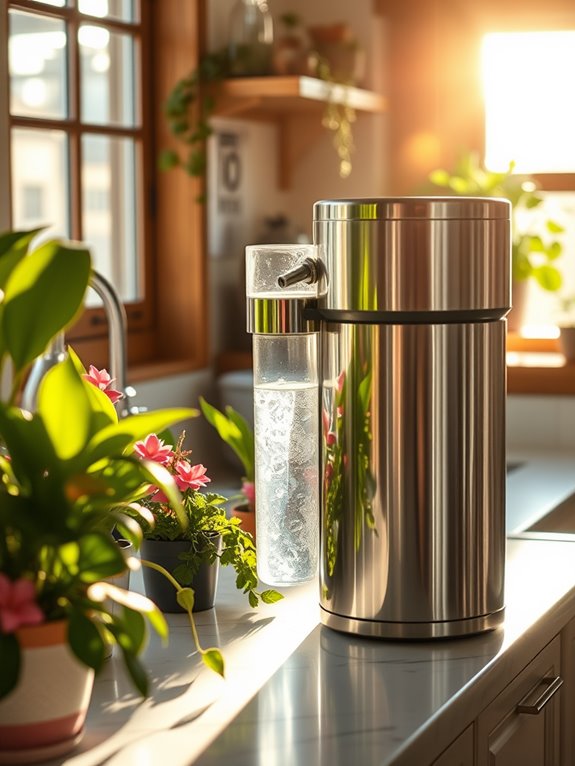Yes, many water filter cartridges can be recyclable, but it depends on their materials and the programs offered by manufacturers. Some brands, like Brita and PUR, have partnered with recycling initiatives to guarantee proper disposal. To recycle effectively, check the cartridge components and find local recycling options. You can also explore reusable and biodegradable alternatives to reduce your environmental impact. Interested in more ways to make sustainable choices? You’ll find plenty of helpful tips ahead.
Understanding Water Filter Cartridges

Water filter cartridges play an essential role in ensuring the purity of your drinking water. They trap contaminants, such as chlorine, sediment, and heavy metals, preventing them from reaching your glass.
When you replace these cartridges regularly, you maintain the effectiveness of your filtration system. It’s vital to choose the right cartridge for your specific filter model to achieve ideal results.
Understanding how these cartridges function helps you appreciate their importance. You’ll notice a difference in taste and quality when you use a fresh cartridge.
Materials Commonly Used in Water Filter Cartridges
Although you might not think about it, the materials used in water filter cartridges greatly impact their effectiveness and lifespan. Different components serve unique purposes, which can affect your water quality. Here’s a quick overview of common materials:
| Material | Purpose |
|---|---|
| Activated Carbon | Adsorbs impurities and odors |
| Ceramic | Filters out bacteria and sediments |
| Ion Exchange Resin | Removes heavy metals and minerals |
| Plastic Housing | Provides structural integrity |
Choosing cartridges made from quality materials can enhance your filtration experience, ensuring cleaner, safer water for you and your family.
You might also be interested in: Are All Water Filters the Same? Understanding the Key Differences
The Recycling Process for Water Filter Cartridges

When considering the recycling process for water filter cartridges, it’s important to recognize that not all cartridges are created equal.
First, check the materials used in your cartridge; some are made from plastic and others from composite materials.
Next, separate the components if possible. Many recycling facilities require this step to process the materials effectively.
Then, look for local recycling options that accept these specific materials. If your cartridge isn’t recyclable through your curbside program, consider mailing it to specialized recycling centers.
Always follow the guidelines to guarantee your efforts contribute to a more sustainable future.
There’s more to explore! Here’s another valuable read: Are Water Filter Cartridges Interchangeable? Here’s What You Should Know
Brands That Offer Recycling Programs
Many major brands now offer recycling programs for their water filter cartridges, making it easier for you to contribute to a greener planet.
You can participate by following their guidelines, which often include mailing back used cartridges or dropping them off at designated locations.
Understanding the environmental impact of these initiatives can help you see the difference your efforts make.
Major Brands Recycling Initiatives
As you explore options for recycling water filter cartridges, you’ll find that several major brands have stepped up with dedicated recycling initiatives.
Brands like Brita, PUR, and ZeroWater have recognized the importance of sustainability and offer programs to help you recycle used cartridges.
Brita, for example, partners with TerraCycle, allowing you to send in your filters for proper processing. PUR also offers a similar program, ensuring their cartridges don’t end up in landfills.
How to Participate
If you’re looking to recycle your water filter cartridges, several brands have made it easy to participate in their recycling programs.
Companies like Brita and PUR offer mail-in options where you can send your used cartridges for proper recycling. Simply check their websites for specific instructions and mailing addresses.
Some retailers even have drop-off bins for used cartridges. Additionally, keep an eye out for local events or partnerships that promote recycling initiatives.
Environmental Impact Assessment
Recycling programs offered by water filter brands play a significant role in addressing environmental issues. By participating in these initiatives, you help reduce plastic waste and promote sustainability. Brands like Brita, PUR, and ZeroWater provide convenient options for recycling used cartridges, ensuring they’re processed responsibly.
| Brand | Recycling Program | Environmental Benefit |
|---|---|---|
| Brita | Mail-in program | Reduces landfill waste |
| PUR | Drop-off locations | Encourages proper disposal |
| ZeroWater | Partnership with TerraCycle | Recycles materials into new products |
| Aquasana | Free recycling kits | Minimizes environmental impact |
| Nakii | Online recycling portal | Promotes circular economy |
How to Properly Dispose of Used Cartridges

When you’re ready to dispose of used water filter cartridges, it’s crucial to follow the right steps to minimize environmental impact.
First, check if your manufacturer offers a take-back program; many do. If not, remove any non-filter components and rinse the cartridge to reduce contaminants.
Place the used cartridge in a sealed bag to prevent leakage, then throw it in the trash, as most cartridges aren’t recyclable through curbside programs.
Never toss them in recycling bins.
Finally, consider contacting local waste facilities for specific disposal guidelines, ensuring you’re making the most responsible choice for the environment.
Alternatives to Traditional Water Filter Cartridges
If you’re looking for eco-friendly options, consider alternatives to traditional water filter cartridges.
Reusable filter systems, ceramic water filters, and activated carbon alternatives offer sustainable ways to purify your water without the waste.
These choices not only reduce your environmental impact but also provide effective filtration solutions.
Reusable Filter Systems
While traditional water filter cartridges often end up in landfills, reusable filter systems offer a sustainable alternative that can help reduce waste.
By choosing reusable filters, you not only minimize your environmental impact but also save money in the long run. These systems typically use durable materials that can be cleaned and reused multiple times.
Consider the following benefits of switching to a reusable filter system:
- Reduced plastic waste
- Cost-effective over time
- Improved filtration options
- Easy maintenance and cleaning
Making the switch to reusable filters is a simple yet effective way to contribute to a healthier planet.
Ceramic Water Filters
Ceramic water filters provide an eco-friendly alternative to traditional water filter cartridges. They effectively remove contaminants while being reusable and long-lasting. By choosing ceramic filters, you reduce plastic waste and lower your environmental footprint.
Here’s a quick comparison of ceramic water filters:
| Feature | Ceramic Filters | Traditional Cartridges |
|---|---|---|
| Reusability | Yes | No |
| Contaminant Removal | High | Moderate |
| Environmental Impact | Low | High |
| Lifespan | Years | Months |
| Cost Over Time | Lower | Higher |
Making the switch can benefit both you and the planet!
Activated Carbon Alternatives
When considering alternatives to traditional water filter cartridges, activated carbon options stand out for their effectiveness and sustainability.
These alternatives not only improve water quality but also minimize environmental impact. You might want to explore these options:
- Coconut Shell Carbon: A renewable resource that filters efficiently and reduces waste.
- Granular Activated Carbon (GAC): Versatile and widely used, it provides excellent adsorption capabilities.
- Biodegradable Filters: Made from natural materials, they break down without harming the environment.
- Ion Exchange Resins: Effective for removing specific contaminants, these can be regenerated for repeated use.
Choose wisely for cleaner water and a greener planet!
The Impact of Choosing Sustainable Water Filters

Choosing sustainable water filters not only benefits your health but also helps protect the environment. When you opt for filters made from eco-friendly materials, you reduce plastic waste and decrease harmful pollutants entering landfills.
These filters often use natural elements, like activated carbon, that purify water without releasing toxins. By making this choice, you support companies committed to sustainable practices, encouraging a shift in the industry towards greener alternatives.
Plus, cleaner water enhances your well-being, providing you with better-tasting, safer drinking options. Ultimately, your decision makes a difference for both you and the planet, creating a healthier future for everyone.
Conclusion
In the journey towards sustainability, every choice you make is a drop in the ocean of change. By recycling water filter cartridges and opting for eco-friendly alternatives, you’re not just reducing waste; you’re planting seeds for a greener future. Remember, each small effort ripples outward, creating waves of positive impact. So, as you sip that clean water, know that your mindful decisions are helping to quench the thirst of our planet for a healthier tomorrow.

I’m Allen Kim, the chief editor of plumbinginto. I am a mid level plumber and assign to an local firm over 4 years of experience. During the working period, most of my experience is related to the house plumbing. I learned about the thing, when working with most experienced people in this sector, one must be as good as the inspector or better with knowledge of the project as well as the practical aspects of plumbing industry.